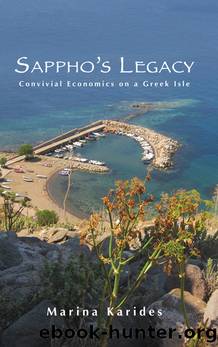Sappho's Legacy by Marina Karides

Author:Marina Karides [Karides, Marina]
Language: eng
Format: epub
Tags: Social Science, Women's Studies, Agriculture & Food
ISBN: 9781438483061
Google: dJb1DwAAQBAJ
Publisher: SUNY Press
Published: 2021-04-01T05:18:59+00:00
Transnational Food and Traveling Locavores
Unlike the bohemian counterculture travelers of the 1960s, who combed islands to live off the land and away from mainstream livelihoods, contemporary food tourists seek consumptive experiences. Privileged Northern travelers who seek to visit places that they perceive as more naturalistic, less stressful, or healthful environments are now also assessing the availability of fresh local food sources when deciding on a travel destination. Although travelers to Greece often remark on the pleasures of dining on fresh local foods, attracting tourism through food has only been approached by the Greek tourist industry in the last few years.
Food tourism is recent and a growing subtopic in the food studies literature (Yun, Hennessey, and MacDonald 2011; Long 2004; Hall and Sharples 2003). Yun, Hennessey, and MacDonaldâs (2011) study of culinary tourism on Prince Edward Island developed a rubric for categorizing the relationship of food and leisure: âdeliberateâ food tourists are those who travel to locations with the intention of dining on local cuisine, âopportunisticâ food travelers seek out local food and drinks, and âaccidentalâ ones eat local foods because that is what is available. Although it would be difficult to unyoke the essence of the travel experience to Lesvos and other Greek islands from the ubiquity of Greek cookery and beverages, I venture that most of those holidaymaking in Greece are likely opportunistic or accidental food tourists.
In July 2009 and 2012 I conducted a short survey over several afternoons with tourists who had escaped the gleaming sunshine by gathering under the awnings of the cafés and tavernas that run along the shoreline. Of the thirty tourists I surveyed, including married and unmarried lesbian couples, straight married couples with children, young single ethnic Greeks, women and men, and retired couples from the UK, approximately 30 percent mentioned food when I asked, âWhat brought you to Skala Eresos?â One respondent, a lesbian-identified Irish woman, explains that she vacations yearly in Lesvos with her father because âthe food, definitely the food, the lesbians are secondary.â Urban Northern Europeans travel to Greece for the relaxation that rural island life offers, and in the case of Skala Eresos, many travel for the camaraderie available to lesbian travelers and facets of bohemia. Yet they also value the availability of fresh foods and Greek preparations of them.
Food tourism, or tourist development via the branding of regional cuisines, is a recent form of gastronomical commodification. Richards (2002, 3) argues that because gastronomy âhas become a significant source of identity formation in postmodern society,â it plays a part in the growing interest in cultural tourism. Niched and specialized travel experiences currently drive the tourist industry, the worldâs largest service sector, as developers around the world attempt to attract visitors to various localities by showcasing exceptional features of a region. In this regard, foodâdistinct recipes, regional interpretations of them, hard to find ingredients, or their freshnessâis now a foremost strategy for tourist development. Local cuisines figuratively feed travelersâ desire for an authentic tourist experiences (Sims 2008).
The popularization of Greek
Download
This site does not store any files on its server. We only index and link to content provided by other sites. Please contact the content providers to delete copyright contents if any and email us, we'll remove relevant links or contents immediately.
Harry Potter and the Goblet Of Fire by J.K. Rowling(3046)
Never by Ken Follett(2881)
Shadow of Night by Deborah Harkness(2718)
Ogilvy on Advertising by David Ogilvy(2682)
Zero to IPO: Over $1 Trillion of Actionable Advice from the World's Most Successful Entrepreneurs by Frederic Kerrest(2396)
The Man Who Died Twice by Richard Osman(2300)
Machine Learning at Scale with H2O by Gregory Keys | David Whiting(2292)
Book of Life by Deborah Harkness(2263)
How Proust Can Change Your Life by Alain De Botton(2261)
My Brilliant Friend by Elena Ferrante(2224)
0041152001443424520 .pdf by Unknown(2220)
The Tipping Point by Malcolm Gladwell(2204)
How to Pay Zero Taxes, 2018 by Jeff A. Schnepper(2100)
Will by Will Smith(2042)
Purple Hibiscus by Chimamanda Ngozi Adichie(1982)
Hooked: A Dark, Contemporary Romance (Never After Series) by Emily McIntire(1960)
Borders by unknow(1785)
Rationality by Steven Pinker(1765)
Daughter of Smoke and Bone by Laini Taylor(1744)
